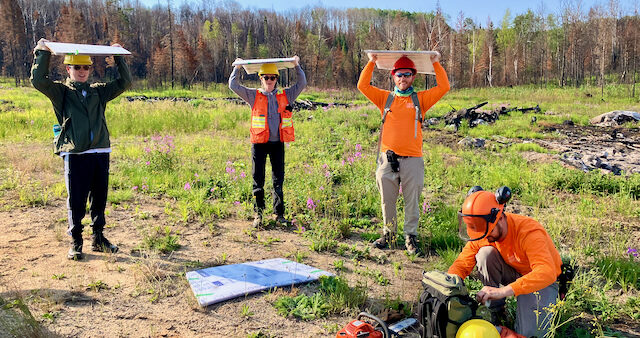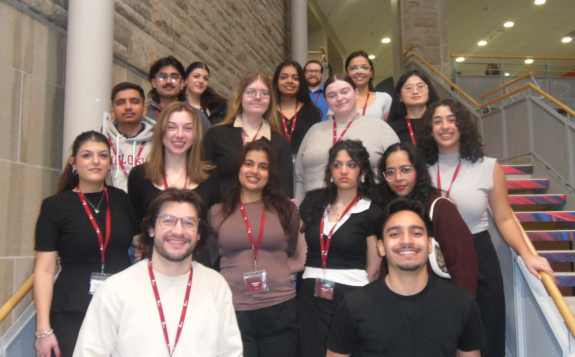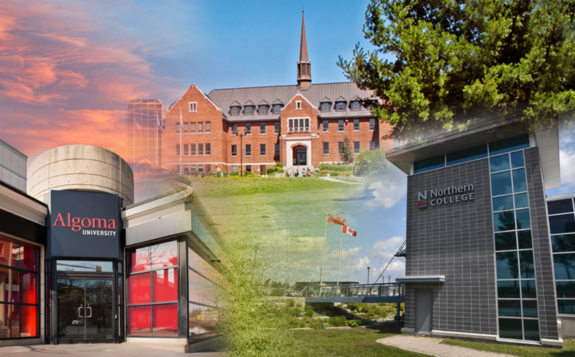Researchers examine what the climate crisis is doing to Canada’s Boreal Forest, and whether measuring animal physiology can help predict environmental threats
(SAULT STE. MARIE, ON — Aug. 30, 2023): On Tuesday, as part of government and foundation funding announcements, researchers at Algoma University were awarded prestigious national grants. Dr. Pedro Antunes, Dr. Christine Madliger and Dr. Bill Dew received funding for their respective work, highlighting the groundbreaking research and innovation being done at Algoma University.
The grants were awarded through the Natural Sciences and Engineering Research Council of Canada (NSERC) and the Canada Foundation for Innovation (CFI) John R. Evans Leaders Fund (JELF). NSERC funds visionaries, explorers and innovators who are searching for scientific and technical breakthroughs that will benefit the country. CFI is a nonprofit investing in research infrastructure at Canadian educational and medical institutions. Through both programs, Algoma University researchers will receive a total of $403,177 for their groundbreaking work.
The research is in line with Algoma University’s academic programming, including the University’s Master of Biology program — an especially powerful reminder that people living in Sault. Ste. Marie, Brampton and the Peel region, or Timmins no longer have to leave home to earn a bachelor’s or master’s degree with sophisticated programming and high-level research.
Antunes’ crucial research focuses on soil biodiversity and its interaction with climate change in the Boreal forest. Focusing on post-fire boreal regeneration under simulated 3°C-warmer conditions, he investigates the potential vulnerability of ecosystems to non-native plant species. By studying the impact of soil life on plant diversity, Antunes aims to enhance the forest’s resilience after stressful events like wildfires. This research not only advances ecological understanding but also contributes to safeguarding the valuable biodiversity of the Boreal forest, benefiting Canadians and global biodiversity efforts alike.
Madliger’s research centres on animals’ physiological responses to environmental change, and uses behavioural and physiological tools for conservation science. Madliger’s work investigates if monitoring stress hormones like cortisol and corticosterone in birds and fish can gauge threats, predict environmental impacts on wildlife, and assess how well conservation projects are working. Her work also examines if assessing an animal’s physiology helps us make accurate predictions for reproductive success and survival across differing conditions. Through the study of the tree swallow, a local breeding bird, Madliger’s research is illuminating how declining insectivorous birds react to food availability changes in northern environments.
Also supported by CFI-JELF funding, Dr. Bill Dew’s research focuses on the sense of smell in fish, and how pollution disrupts it. Fish rely on their sense of smell to perceive chemical cues in their surroundings, guiding vital activities such as foraging, mating, navigation, and predator detection. Pollution-induced impairment of olfaction can disrupt these behaviours, posing grave consequences for individual fish and entire populations.
QUOTES
“Our faculty’s success in competitive funding programs greatly enhances our growing University’s local and global reputation. Dr. Antunes highlighted a significant point that resonates within our institution: Our community no longer needs to seek graduate education elsewhere, as we offer exceptional programs supported by external research grants. Collaborations with scientists at the local, federal and provincial research institutes in Sault Ste. Marie and in industry, such as Algoma Steel, are allowing Algoma students to work on sophisticated research projects and build valuable connections for future employment. Graduates will acquire skills for a changing tech landscape, contributing to Northern Ontario’s sustainable economy and our University’s Special Mission.”
- Dr. Michael Twiss, Dean, Faculty of Science at Algoma University
“I’m thankful to NSERC for continuing to fund my research program. This Discovery Grant enables us to explore questions that help us better understand how human effects such as climate change influence vital systems like the boreal forest, contributing to informed conservation efforts.”
- Dr. Pedro Antunes, Tier II Canada Research Chair, Biology; Head of the School of Life-Sciences and the Environment at Algoma University
“As an early career researcher who is just beginning a research program at Algoma University, I am thankful to receive an NSERC Discovery Grant to study how physiological tools can contribute to the conservation of birds and fish. This funding will support the establishment of new local study sites, collaborative work with the community, and the training of young scientists who can transition to careers focused on solving the global biodiversity crisis.”
- Dr. Christine Madliger, Assistant Professor in Environmental Science, Department of Biology at Algoma University
“I am very grateful to CFI for awarding me this funding. It will not only enhance the research that we do in my lab, but it will also help train students on advanced animal husbandry and neurophysiology techniques.”
- Dr. Bill Dew, Assistant Professor in Environmental Science, Department of Biology at Algoma University
Photo left to right: David Storms,( Biology student at AU), Charlotte Grieve (M.Sc. student at U of T), Ben Angel (OFRI staff) and Dr. Steve Mayor (OFRI Research Scientist and Adjunct Faculty at Algoma University)
Photo Credit: Dr. Pedro Antunes
Share Article



